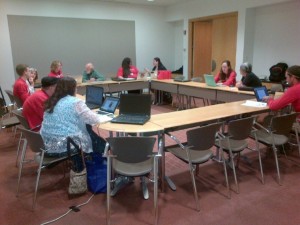Much is being written lately on the topic of literary citizenship. Since this was the topic of my Master’s final research paper, I thought I’d go ahead and weigh in with my two cents. (I could write 50 pages, but I already did that. Let’s see if I can condense my thoughts here into a readable blog post!)
I just happened upon this term in the last couple of years–but it’s something I’ve been thinking about for a long time. You see, I’ve worked in publishing for thirty years and went back to school with the hopes of teaching at the college level. As I sat under Cathy Day, she (thankfully) talked to her students about what’s out there in the real world–how to join the literary world, how to get published, how to organize submissions, how to handle rejection, and how to find their “tribes” once they leave the cocoon of a university writing program–everything I already knew was extremely important for writers to understand.
I was thrilled that she talked about this because too often (I feel) creative writing programs focus only on craft without giving students the tools to know what to do with their writing. Yes, I get it. You have to first be a good writer, no, an excellent writer. That’s a given. Roxane Gay puts it this way:
You’re not going to become a better writer by focusing more on getting your writing published than writing work that merits publication. You won’t become a better writer by resenting the success of others or spending most of your time indulging in conspiracy theories about publishing. Yes, sometimes the game is rigged, but mostly it is not. It’s easy to get wrapped up in the wrong things when so much information about writers and what they’re doing or could be doing is readily available via social networks, blogs, and the like.
So of course, being great writers is step one, and I don’t advise that writers let themselves get distracted by the marketing side at the expense of their product. But, after thirty years in publishing, I come at this with a different perspective, and so I maintain that students should be taught what to do with their writing. How to research the literary magazines or the online sites or the commercial magazines or the book publishers that might be interested in their kind of writing. How to write query letters. How to approach an agent. How to create a book proposal. That’s all part of learning to write.
Because, in the end, while writing can indeed be an end in itself, most of us write because we want people to read what we wrote. We want to share it.
And I’m sure it’s my years in publishing talking, but I’ve sat on the other side of the table, needing to help authors understand the importance of marketing their own books.
I know, what a pain after doing all the work of actually writing the book to have to be burdened with actually doing the marketing, too. Isn’t the publisher supposed to do that? That’s the question Becky Tuch asks and precisely why she detests literary citizenship.
But I understand the business side of publishing; it is a business after all and, if it doesn’t make money, none of us gets published. And yes, all those big-name authors get all of the marketing dollars and the rest of us are left pretty much to fend for ourselves, but there’s a reason for that as well. There’s a statistic in Christian publishing that says 9 percent of the authors sell 80 percent of the books. That means that 9 percent of writers are pretty much carrying their publishing houses. So let them have the marketing dollars! In secular publishing, the number may be similar–and we can be sure that it is indeed the big names who get taken care of. Those authors help keep their companies open, which then allows them to take a chance on little ol’ me.
But here’s the deal–literary citizenship is not to be entered into because you want to sell your books. Instead, it’s about joining  the literary world because that’s who you are. Just as you might identify with those who join the worlds of ComiCon or Renaissance Faires because you have an affinity for comics and superheroes or feathered caps and falconry, so you join the world of Words and Books as a literary citizen because that’s who you are. You join with like-minded people to talk about what you love best.
the literary world because that’s who you are. Just as you might identify with those who join the worlds of ComiCon or Renaissance Faires because you have an affinity for comics and superheroes or feathered caps and falconry, so you join the world of Words and Books as a literary citizen because that’s who you are. You join with like-minded people to talk about what you love best.
The side effect of being “neighborly” in that world (by doing what many lit cit blog posts have discussed regarding ways to be literary citizens) is that when your article or book is published, you can naturally talk about it with those who care–and who will, in turn, talk about it with others. That’s where the “marketing” part actually begins to happen.
But literary citizenship doesn’t start there. It doesn’t start with “marketing” or “selling.” It’s not all about us. It’s not all about “gimme” as in “gimme your attention–me me me” as David Ebenbach describes in his article, Literary Citizenship Does Not Mean Gimme. Instead, it’s about joining a world of word lovers–reading, appreciating, talking about, and sharing one another’s work.
So let’s not hate literary citizenship, let’s embrace it because, in essence, it’s who we are. Let’s come together in this world of Words and Books enjoying what we love most and making sure it continues for all of us for a long, long time.





